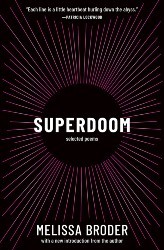Useful Junk, Erika Meitner’s sixth book, surges with amalgamizing energy. When a friend tells the speaker “to use a slightly more capacious/we in my poems,” the collection does not only expand its Whitmanesque collective, it also enlarges to include more versions of the self — “There are so many you’s inside of me.” This is a book that democratically yet intimately gathers all in its path, from Polish ghettos to the art of the butt selfie. As a counterpoint to the openness of these poems, there are repeated moments when the speaker — a busy parent and professor — craves privacy, during which she pulls into parking lots of big-box stores and sits in her car. The sense of relief is palpable: here is an American space where women can park and be left alone. A space so private that — as “Are Your Popular? (1947)” darkly demonstrates — they can even be dead in their car and still no one notices or bothers them.
The Jewish elements of Useful Junk, while less explicit than in Meitner’s Berru Award-winning Holy Moly Carry Me (2018), are still central to the book. We learn that the sexuality pulsing through the collection is not only “another trick of perimenopause.” The sexuality also stems from a warning from the speaker’s grandmother who, in her “clipped Czech accent,” instructed the speaker “to stay open to pleasure to provide pleasure to accept pleasure.” This may be the same grandmother we meet in “My True List of Facts” who worked as a nurse-midwife in the Sosnowiec ghetto and had to “euthanize her own daughter whom I was named for because/the SS were tossing babies from the windows of cattle cars.” In other words, this book’s imperative to seek pleasure is also a testament to — and revenge for — how much pleasure has been stolen, stifled, and murdered.
While this collection’s speaker does not “feel at home anywhere except some subway platforms/and when I’m in motion passing through corridors or terminals,” we nevertheless get some vital depictions of rural and industrial Appalachia, an underexamined region in Jewish poetics. Importantly, this speaker does not just toss in Appalachian scenery as a metaphor for her own pain — a common trope in contemporary poetry. On the contrary, this speaker addresses the devaluation of the region: “the New River is one of the five oldest rivers/in the world but no one who doesn’t live here knows this I live here.” When this speaker drives past factories, she knows what she is driving past:
riding shotgun past the Celanese plant
at dusk mid-December this sprawling factory on the New River
the world’s largest producer of cellulose acetate tow used in
cigarette filters lit by sodium vapor the plant glows orange-
tipped the smokestacks smoking
This is a book with “views//of black cows, heads bent/some galloping across a field” and “a runaway/truck ramp on I‑85, rutted.” In a line that perhaps best captures the collection’s intersection of sexuality and place, the speaker takes nude selfies and remarks “I don’t care if neighbors who shoot and four-wheel at the same time see me.” Indeed, Meitner’s virtuosic range and command of place result in a book that insists that we see and understand each other. “Listen” she writes, “we are making//art because we want to inhabit everything/and not fear it” .
Allison Pitinii Davis is the author of Line Study of a Motel Clerk (Baobab Press, 2017), a finalist for the Berru Poetry Award and the Ohioana Book Award.





